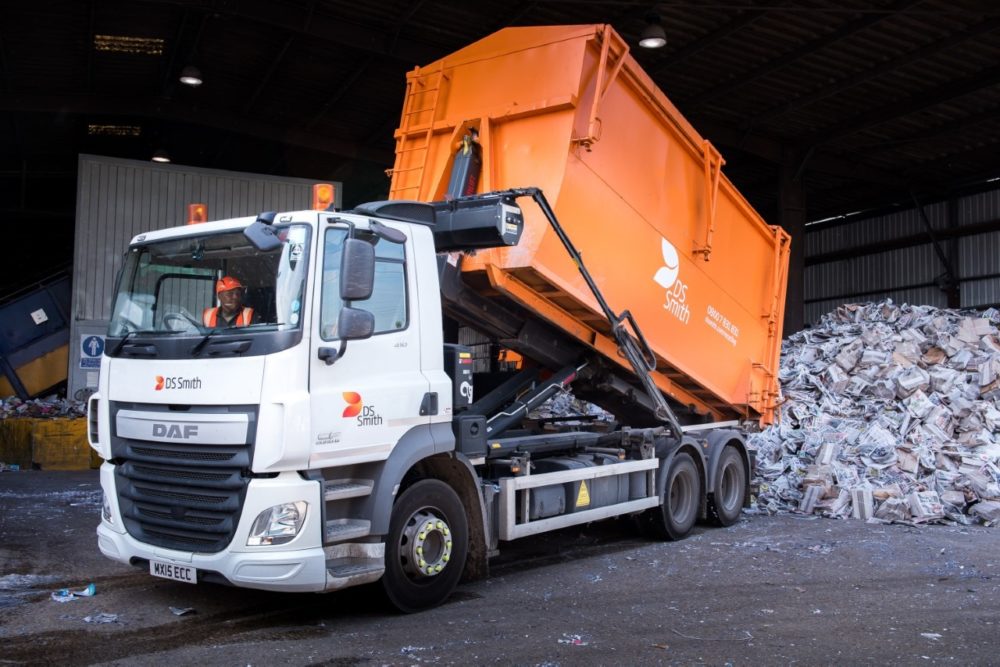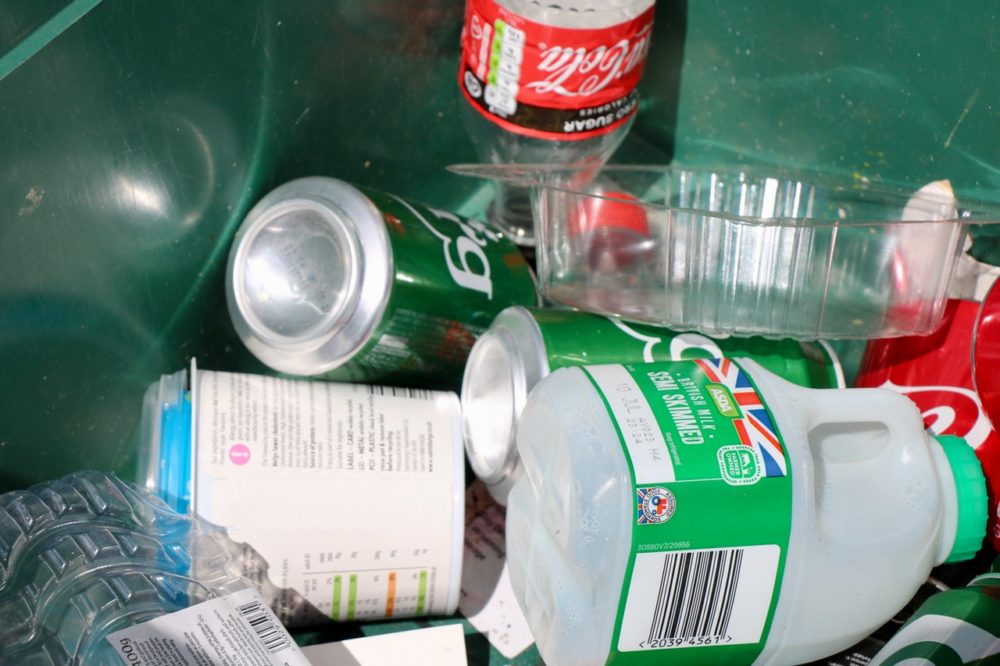DS Smith, one of Europe’s largest recyclers of cardboard and paper, says it is not currently experiencing any significant disruptions

LARAC CEO Lee Marshall believes the industry is “working quite well” at the moment during the coronavirus pandemic (Credit: DS Smith)
The UK recycling system has faced new challenges over the past few weeks as the effects of coronavirus spread into all aspects of daily life.
Across the recycling industry, the disease has led to staff shortages and reduced pick-up rates despite increased volumes of household waste due to lockdown restrictions.
However, London-headquartered DS Smith, one of Europe’s largest recyclers of cardboard and paper, has said it is not currently experiencing any significant disruptions and is not seeing a shortage of paper and card coming through supply chains.
Local Authority Recycling Advisory Committee (LARAC) CEO Lee Marshall, who has been meeting with the UK government’s Department for Environment, Food and Rural Affairs (DEFRA) during the pandemic, believes “there is only so much planning you can do”, but that the industry is currently “working quite well”.
“The lead up to the exit from the EU was probably helpful in terms of planning and thinking about these sorts of scenarios, so we are about as robust as we could be for something like this,” he adds.
“Because the commercial deliveries are not happening, some of the private waste companies have got vehicles and crews that aren’t being utilised, so we are looking at how they can then be put across onto household waste collections to keep that going.”
How the UK recycling system has responded to the coronavirus
As the coronavirus crisis unfolded, Marshall says local authorities across the UK enacted emergency plans for all their services.
As a result, several council’s have reduced waste collections following staff shortages due to self-isolation guidelines issued by the government.
Marshall says most of them have a hierarchy of services, which they will either change, reduce or switch off as staff absence levels increase.
“What most of the councils did as the government announced restrictions around essential travel is close the Household Waste Recycling Centres (HWRC) and Civic Amenity (CA) sites,” he adds.
“The week before the announcement, the sites had been quite well used and they had a lot of trouble implementing adequate social distancing, so there were issues around being able to operate the sites efficiently and safely.
“That has cut off a feed of certain materials, because obviously they are not coming into the HWRCs to then pass onto the material processors.”

For curbside collections, Marshall says some councils have stopped bulky waste pick-ups, such as washing machines, as well as garden waste services, while many are looking to reduce their street cleaning and ground maintenance activities to redeploy staff across other areas.
If the virus continues to impact employee numbers, the last areas expected to be affected are recycling, residual and food collections – but Marshall believes this may well only be on a reduced service schedule, rather than removing them altogether.
He says while there are legal requirements around collecting household waste, he expects there would potentially be a “relaxation of those requirements” given the circumstances.
Providing an example of laws that may require flexibility, Marshall notes the environment agency could “take a slightly different view on how they regulate waste sites and allow them maybe to store more waste than they would normally for a temporary period”.
How DS Smith’s recycling business is operating during the coronavirus crisis
DS Smith, which manages more than 5.5 million tonnes of packaging material a year, claims recycling is at the “heart of everything” it does because its “business depends on it”.
The firm has spent more than 40 years building up its reputation in the industry and now its closed-loop offering on items ensures as many materials as possible are recycled, instead of simply being “burned for a quick energy fix”.
Its recycling arm is a standalone business within the DS Smith group and, although its largest customer when it comes to buying materials is its internal paper mills, the company runs its own profit and loss – meaning it makes decisions based on different business cases and runs alternate models across individual countries.

At its paper mill in Kemsley, Kent, in south-east England, DS Smith takes about one million tonnes of paper to be recycled annually – about a third of the total figures processed of the material across Britain each year.
DS Smith’s head of recycling Jochen Behr says the firm is currently able to secure enough fibre and that recycling has been regarded as a “critical industry” in the UK – meaning operations can continue.
In following the government’s guidelines on social distancing, the firm has reduced the number of people in its offices, with staff working from home, and provided workers in depots with the appropriate equipment, such as masks and disinfectants.
The importance of keeping supply chains moving during the coronavirus pandemic
Although some councils have had conversations around suspending some recycling services, Behr says the company is working closely with local authorities and “encouraging them to maintain collections”.
He believes this is important to “support the supply of essential raw materials which underpins the critical work of the paper and packaging industry in keeping essential goods moving”.
Behr adds the firm is continuing to receive a “strong supply” of materials from the retail sector, while it is experiencing a “spike in material delivered from the grocery retail sector”, driven by “increased consumer demand” during the crisis.
But he reveals that going forward, the recycler is “planning for a decline in material coming directly from certain manufacturing sectors”, which he expects to be “offset by the retailers”.
Behr believes the firm is well-positioned to draw on its Europe-wide infrastructure, to ensure there is no cardboard shortage in areas where it is needed most.

Across Europe, DS Smith is currently seeing enough availability of cardboard for recycling but is monitoring the situation as the pandemic continues to affect countries in different ways.
Behr highlights the management of transport restrictions and the availability of staff as a key factor for keeping operations moving.
“A lot of governments have recognised that paper and cardboard is quite critical for the supply chains,” he adds.
“Because we are supporting essential products like food, pharmaceuticals, medicine — and ensuring they can actually move from A to B.
“It’s quite important that we keep the whole supply chain going, from collecting and recycling the materials to creating the packaging.
“It is good to see that a lot of governments across Europe, including the UK, have recognised that — it is really important for us.”
How can the UK improve its recycling system moving forwards?
The UK is looking increasingly likely to miss out on its target to recycle at least 50% of household waste by the end of this year, with the current rate standing at about 45%.
In DS Smith’s report, titled The Tipping Point, it highlights that Britain could fail to hit its 2035 ambition to recycle 65% of municipal waste by more than a decade if it doesn’t make changes.
The analysis says the UK is at a “critical juncture” and waste management systems need to be “radically reformed to cope with the demands of the modern economy”, and to “meet environmental sustainability targets and aspirations”.
It believes as levels of e-commerce continue to rise in the coming years, there will be an increase in recyclables entering homes.
The report claims that the UK could miss its 2035 target as a result of “years of underinvestment and, more recently, the restriction by overseas markets of the quality of recyclables they are prepared to buy and re-process”.
It adds that “radical reform can lead England and the rest of the UK on a brighter path” that meets public expectation for a “better environment” – and that “now is the time to act”.
Talking about the individual changes he believes the UK needs to make, Behr pinpoints design for recyclability, enabling consumers to make the right choices, and providing the infrastructure so consumers can recycle properly as priorities.
“What we need to have, and I think the government is quite willing and open to do this, is more investment into the recycling infrastructure,” he adds.
“For paper, around 50% of the cardboard and paper we are collecting in the UK, can’t be recycled here and has to leave the country.
“I think that is an area where we just need to see a little more investment to make sure that we can actually do it locally.”
